Schlagwort: ‘Practical year’
My practical year in Montpellier
- Medicine
- France, Montpellier
- Centre Hospitalier Universitaire (CHU) de Montpellier
- 07/2024 – 10/2024
1. Application/Finding an Internship
From an early stage, it was clear to me that I wanted to complete a substantial part of my practical year, my medical internship, abroad. After planning my first rotation in Dubai and having my second in Germany, I wanted to see and experience something different for my third rotation. I chose to take another challenge: general surgery in Montpellier, Southern France. The application process was relatively straightforward; I sent an email to the head of the department in early 2024, and my application was quickly accepted. Further organization was handled through the universities in France and Germany. The process in France was similar to that in Germany, requiring vaccination records, certain health tests, and proof of insurance. Thanks to EU agreements, I didn’t have to worry about obtaining a visa.
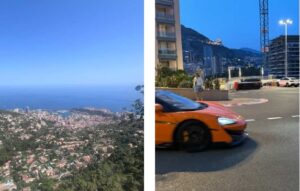
Monaco (left) and the Fairmont Hairpin Curve (right) ©Julia-Laura Schulz
Further planning included my travel arrangements and accommodation. I combined my journey with my family as a little road trip through Switzerland, Italy, and Monaco. For accommodation, I recommend student dormitories, but it is important to note that not all of them accept short-term stays, especially those that span multiple semesters. While I found it easy to secure accommodation for the semester holidays at the start of my internship, I had to move at the beginning of the new semester. Finding new accommodation was quite stressful and not easy, given my work routine and studies. However, in the end, everything worked out.
2. Accommodation & Living Expenses
During my internship, I opted for student housing, which offered a more affordable living option compared to private apartments. The costs for living in Montpellier were manageable, especially considering the financial support I received. I found that groceries were reasonably priced, but dining out could become expensive.
The student dormitories offered essential amenities, such as kitchen facilities, allowing me to cook my own meals, which helped keep my expenses down. While I didn’t strictly budget, I was mindful of my spending since I also wanted to indulge in the local cuisine and travel during my free time. Overall, Montpellier is a vibrant city, and the cost of living was reasonable for a student lifestyle.
3. Everyday Life/The Internship
On the first day of my internship, I registered at the medical faculty next to the hospital, where I enrolled alongside other Erasmus students. I then went directly to the General, Visceral, and Transplant Surgery department, known as “Chirurgie B.” The senior physician responsible for externes showed me around the unit and explained the processes. In France, medical students are referred to as “externes,” while resident doctors are called “internes,” which can be confusing at first, as “interns” in English usually refers to final-year medical students. Our team typically consisted of three German and two French students. The French externes usually rotate every few weeks, which allowed me to meet many different people.
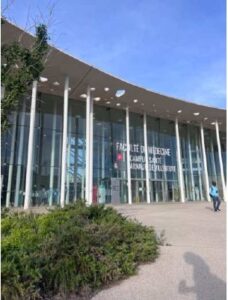
Faculty of Medicine ©Julia-Laura Schulz
Each week, we were assigned to a department, which could include the ward, the operating room, or outpatient clinics. Depending on our interests, we also had the opportunity to rotate through radiology, endoscopy, and anesthesia. Additionally, we had one to two on-call shifts each week (including weekends) for liver transplants. A typical day began with the morning handover from the night shift and a round of visits to all patients on both the general and intensive care wards. After the handover, everyone focused on their own tasks. Once a week, usually on Fridays, there were classes for students, often in the form of OSCE exercises. These sessions were highly educational, although the language barrier sometimes created a tense, exam-like environment. After the classes, the entire team would gather to review and discuss the surgical schedule for the upcoming week, deliberating on various cases. During these discussions, both attending and senior physicians often posed questions to both internes and externes. Additionally, once a month, the internes gave presentations, which were followed by the big weekly rounds.
The general ward was structured similarly to those in Germany, consisting of double and single rooms. The intensive care unit primarily had single rooms, and the operating rooms were comparably designed. Access to various areas of the hospital was secured with access codes. Both internes and externes had a dedicated room on the ward equipped with computers and lockers. All externes received a personal account for the duration of their stay to access computers and the hospital information system.
A particular highlight in Chirurgie B were the liver transplants. During the 24-hour on-call shifts, the ones on-call were responsible for these procedures and had to be prepared to stand in the operating room for about eight hours straight. There was also the opportunity to voluntarily participate in organ retrieval, which often involved traveling to different locations or even flying by private jet. On one occasion, we were escorted by the police, which felt like a movie and was incredibly exciting. The retrieval process is very moving and deeply impressive, as it represents the final and selfless act of brain-dead patients. After retrieval, the liver is transported in a cooled state and appears gray; however, after several hours of surgery and restoration of blood flow, it regains its dark red color. This moment is magical and makes all worries, back pain, and fatigue fade away.
One challenging aspect was the work environment in the department. There was often a tense atmosphere among the resident doctors, which sometimes affected us externes. This led to conflicts between internes and externes, causing misunderstandings with the attending physicians and resulting in stricter oversight. However, thanks to the camaraderie among the externes, this was manageable.
I also wanted to gain insight into neurosurgery, so I contacted the chief physician, who invited me to observe a particularly interesting procedure: an awake brain surgery. The patient underwent head surgery and was awakened for about an hour during the procedure with the assistance of neuropsychologists, who guided her to perform various tasks in order to minimize the risks associated with the surgery. Since I have a strong interest in neurosurgery, this was definitely one of my personal highlights at the clinic.
Despite the initial language barrier and different dialects, I quickly settled in and was able to learn a lot. I observed procedures that I had only previously studied in theory. The awake surgery and the liver transplants were undoubtedly extraordinary experiences that left a lasting impression on me. I would like to extend a special thank you to my colleagues, whose support made the stress of the internship much more bearable. Moreover, the opportunity to forge international connections and broaden my horizons was particularly valuable.
4. Free Time/Tips
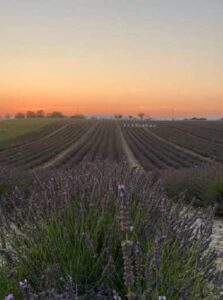
Lavender Fields, Provence ©Julia-Laura Schulz
From the beginning, I met many nice people. After work, we often arranged to meet for dinner, take weekend trips, go canoeing, or even play mini-golf together. A particularly memorable trip was to the lavender fields in Provence, which were breathtakingly beautiful. Watching the Euro football matches together was another unforgettable experience 4 especially the public viewing when France was playing, which created an incredible, lively atmosphere. We also went on trips with the Erasmus group, including horse riding in the Camargue, which was a unique way to explore the region. Numerous wonderful moments were created, and I have many pictures that I enjoy looking at repeatedly.
To pursue my passion for golf, I joined a golf club in Montpellier, where I regularly participated in courses. I met many other golfers, but since this was my last internship rotation, I also had to study for the third state exam, which meant sacrificing some of my free time. During this time, I discovered the university libraries, which I also liked.
The location of Montpellier allowed me to take many trips across Southern Europe. For example, I was able to meet friends in Barcelona or pick up my cousin from her language course in Nice. A particular highlight was our family reunion in Venice for my mother’s birthday, where family members from the USA, the Dominican Republic, and Germany came together. It was wonderful to see the surprised faces of my relatives when they saw us there.
Another delightful moment was when friends from Germany visited me, and we spent a wonderful week together. We explored the city, enjoyed the local cuisine, and shared many unforgettable moments.
On Sundays, I attended mass at various Catholic churches around the city, including the cathedral. Following the mass in French wasn9t always easy, but reading the liturgy beforehand in both German and French helped me follow along more easily and gain more from the sermon.
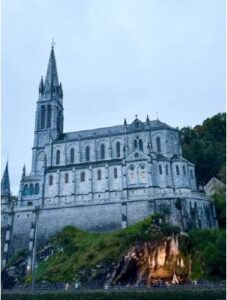
Lourdes ©Julia-Laura Schulz
For my return journey, my family picked me up, and we drove back via Lourdes and Paris. The Rosary procession and the water ritual formed a meaningful and memorable conclusion to my internship.
5. Conclusion
In conclusion, I can confidently say that the last rotation of my internship abroad was a complete success. I learned not only a lot professionally and linguistically but also gained numerous experiences, impressions, and valuable contacts. Montpellier taught me so much, and this experience will stay with me forever. Therefore, I would like to sincerely thank the Erasmus+ internship program for their support, which, along with my family’s assistance, made this stay possible. If you have any further questions, I am happy to help. Thank you!
My practical year in France
- Staatsexamen, Medizin
- Rouen, France
- Hôpital Charles-Nicolle de Rouen
- May 2022 – September 2022
Preparation
The preparation began about a year before I started my Practical year (Praktisches Jahr- PJ). For the registration and application, I contacted Ms. Watteel directly, who is responsible for Erasmus stays at Université de Rouen Normandie. She was my contact person during the entire Erasmus stay and took care of all formal requirements and certificates in a timely manner.
Housing
Accommodation can be found at leboncoin.fr (something like Ebay in Germany) or Facebook. There is also the possibility to apply for student residences, but I did not do this. Furthermore, there are many real estate companies in Rouen that rent both furnished and unfurnished apartments. It should be noted that if the apartment is rented through a company, a fee of approximately one month’s rent must be paid. For students, the right side of the city is warmly recommended, because most of the activities and parties are on this side of the city. There are good bus connections to other parts of the city, but they are very limited at night. The university hospital is located almost in the city center and is easily accessible by public transportation.
Job and everyday life
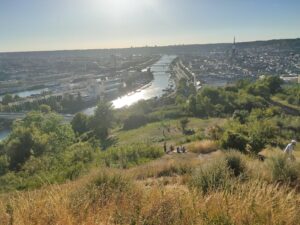
© Lara Gubeljak
I completed a PJ tertial in the clinic for general surgery (chirurgie digestive). There I was in the OR every day and was allowed to assist most of the time, be it directly on the patient or administering the instruments. There were many opportunities for me to actively participate. I found it very good that I was allowed to sew up, that I could participate in organ donations, and that I was also able to perform some tasks beyond the student tasks. A normal day started at 7:30 a.m. and ended between 4:00 p.m. and 6:30 p.m. The visceral surgery team was very nice and had a lot of patience, especially when I occasionally didn’t understand things because of the language barrier. There were some doctors who also explained things in English, although this is not the rule in France.
For the internship, you get a reimbursement of about 250€ per month, but you must check with the HR department often and have a French bank account. All students who are currently doing their internship in a surgical department share the 24 hour duties among themselves. These services are additionally paid but are not obligatory for exchange students. During the night duty you have to do instrumentation and assist in the OR. You get your own room with your own DECT phone. If you are lucky and there are no emergencies, you may (and should!) sleep.
Leisure
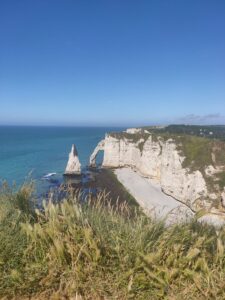
© Lara Gubeljak
I was very fortunate to have a large circle of friends in Rouen, which made the stay overall very social and gave a different perspective to the busy PJ. It is very common to end the evening in a bar or café, although it must be said that due to the early working hours this was often not possible. Rouen is a student city and there is always something going on. In summer there are concerts every Thursday, there is the daily Cathederal de Lumiere, which was exciting every time again. It is a beautiful city from the Middle Ages, so there is a lot of history to see. The numerous museums are free until the age of 26. The surrounding cities like Paris, Le Havre, Étretat or Vernon are very worth seeing and easy to reach by train.
Conclusion
Rouen should and can definitely be recommended for tourism as well as for the PJ. I learned a lot there, was able to do a lot of practical work and strengthened many social skills in the professional setting. The beginning of the PJ was very exhausting, because a lot of things happened very quickly in the hospital and the medical terminology is clearly different, plus it contains many abbreviations. It was a great opportunity to deepen my French and to get an insight into general surgery. Four months were enough to settle in well and to get a little insight into the rest of Normandy.

